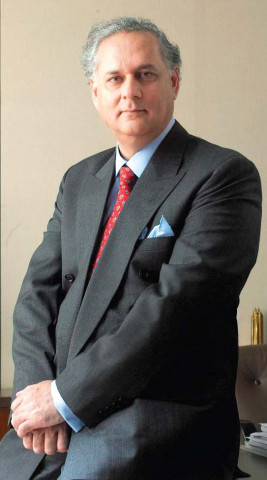Government’s fiscal irresponsibility blamed for decline in consumer banking
Bank Alfalah shelves plan of launching Islamic banking as separate entity.

Government’s fiscal irresponsibility blamed for decline in consumer banking
However, the bank’s reliance on the segment has dwindled as consumer appetite for credit has gone down over the past couple of years. Sirajuddin Aziz, CEO of Bank Alfalah, conceded that the bank had to consolidate its consumer operations due to adverse economic conditions.
“In 2007, we had financed about 100,000 cars and the average portfolio stood at Rs24 billion, whereas currently we have about 56,000 cars with an average portfolio of Rs10 billion,” said Aziz in an interview with The Express Tribune, providing a snapshot of the current state of Pakistan’s banking industry.
Bank Alfalah was incorporated as a limited company in 1992 but started banking operations in November 1997. In addition to over 300 branches in Pakistan, the bank also has a presence in Bahrain, Bangladesh and Afghanistan.
“Consumer banking is in a pause,” summarised the CEO. He complained that banks had to bear the brunt of changes on the macro level. “The industry average for non-performing loans (NPL) increased to about 12 per cent in 2008-09.”
Aziz admitted that the bank had to double its provision for NPLs to about six per cent in 2009 but downplayed the negative impact this has had on the bank’s performance. “We are concentrating on consolidating the business by getting rid of high-cost deposits and developing low-cost and free deposits,” shared Aziz about the bank’s plans.
He pinned responsibility for the decline in consumer banking on inconsistent policies and the mismatch between government revenue and expenditure. Criticising the government for lack of planning on the economic front, Bank Alfalah’s top boss asserted that the country was in need of a 15 to 20-year financial strategy, regardless of who was in power.
“Callous fiscal expenditure has fuelled inflation while the tax to gross domestic product (GDP) ratio continues to drop,” said Aziz. He believes that sharp increases in interest rates through the State Bank’s monetary tightening comes in response to the fiscal indiscipline of the government.
Commenting on the monetary tightening regime, Aziz agreed that the central bank had very limited tools at its disposal and hence relied on changing cash reserve requirements or the discount rate. “But this is not enough to counter fiscal irresponsibility,” he maintained.
Islamic banking on hold
Bank Alfalah has also put on hold plans for spinning off the Islamic banking business as a separate entity. Aziz disclosed that the bank was all set to go ahead with a parallel Islamic bank but explained that market conditions are not suitable at present.
The State Bank, in August, had allowed Bank Alfalah to set up an Islamic bank as a subsidiary. It was the first time in the history of Pakistan that a conventional bank had been given the nod to establish an Islamic bank as an auxiliary organisation.
Highlighting the uncertain law and order situation in the country and mushrooming economic crisis, he questioned: “Who will invest in the country in the current scenario?”
The bank also has a similar take on the agriculture sector. “We were the first from the private sector to enter livestock but the experience has not been great,” said Aziz.
Nonetheless, he asserted that while the recent floods have caused devastation on a massive scale, they may improve conditions for agriculture in the long run. “This seems to be a good time to invest in agriculture and we may see bumper crops in coming months.”
Denial
‘Mergers are a nightmare’
Aziz dispelled assertions that Bank Alfalah may seek to merge with other banks in order to meet capital adequacy requirements set forth by the State Bank of Pakistan. “We firmly believe in organic growth and the group behind us is willing – and able – to deploy additional capital if and when needed,” he said. “Mergers are a nightmare,” concluded Aziz.
The bank is backed by the Abu Dhabi Group which is represented in Pakistan by heavyweights like UBL, Warid, Wateen Telecom and most recently: Al Razi Healthcare.
Published in The Express Tribune, October 22nd, 2010.



















COMMENTS
Comments are moderated and generally will be posted if they are on-topic and not abusive.
For more information, please see our Comments FAQ